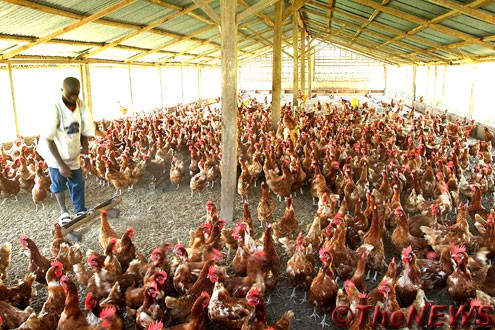ECONOMY 360: Why we must save Nigerian poultry sector from collapse

Penultimate weekend, I was at The Polytechnic Ibadan, Oyo State, where I bumped into some young people talking about the imminent collapse of a poultry farm located somewhere on the outskirts of the city.
I listened in as one of the young men regaled the gathering with tales of how losses and non-payment of salaries have frustrated the poultry owner(s) and forced many “casual workers” out of the workforce. Apparently, like many other young people, the young man was one of the casual workers who relied on money he earned working at the poultry farm to fund their education. That encounter, for the umpteenth time, heightened my fear about the dire conditions Nigerian poultry farmers now find themselves.
Prior to that period, I had watched several disturbing videos of farmers lamenting the losses incurred due to the CBN cash crunch and how they now struggle to stay in business in the face of mounting debts. The social media space is also awash with videos of poultry farmers destroying tens and hundreds of crates of (spoiled/rotten) eggs they couldn’t sell at the height of the uncertainty thrown up by the naira scarcity.
But the losses recorded against the backdrop of the CBN naira redesign policy only worsened an already bad situation; all of the signs of uncertainties have been palpable in the sector all along.
Long before the recent cash crunch-induced glut forced many poultry farmers out of business, the sector has been plagued by numerous concerns in the past. Last year, at a meeting held by the Plateau State chapter of Poultry Association of Nigeria, Nanji Gambo, the state secretary, stated that there was a decline in the membership of the body because some producers were abandoning the business. The PAN official listed the high cost of feeds and huge losses as some of the underlying causes.
Earlier in March, poultry farmers had lamented how the cash crunch affected sales of poultry products (eggs, broilers, etc) amidst high prices of poultry feeds, despite recording unprecedented losses and selling off their chickens at ridiculous prices just to remain in business.
It’s been a very sad period for these business owners!
The agriculture sector has contributed an average of about 24% to National GDP since 2018, providing opportunities for Nigerians across its four major (sub-)sectors––crop production, fishing, livestock/poultry and forestry. The sector also employs more than 36% of Nigeria’s labour force and ranks easily as the largest employer of labour in the country.
But the sector isn’t without its challenges. According to the GDP report released by the nation’s statistics bureau in February, the agriculture sector grew by 2.05 per cent as its performance was significantly hampered by severe incidences of flood recorded last year. In fact, the NBS said that even though the performance of the services sector improved in 2022, the agriculture and industry sectors (under)performances negatively impacted the overall GDP numbers significantly.
Meanwhile, as important as the entire agricultural sector is to the economy, the poultry sub-sector remains a major driver of growth in the sector. In 2019, the Central Bank of Nigeria (CBN) categorised the poultry sub-sector as the most commercialised of all Nigeria’s agricultural sub-sectors, with a net worth of N1.6 trillion. That represented about 25% of agricultural contributions to the GDP, according to the CBN.

A separate Rabobank’s 2017 report (A Time for Africa) noted that four West African countries including Ghana, Côte d’Ivoire, Benin, and Nigeria show the most potential for poultry sector development, in terms of increasing local demand and the incentives available, both fiscal and non-fiscal. Apart from being a major source of protein for many Nigerians, it also employs about 25 million persons across the value chain, according to the Netherlands Enterprise Agency, which also claims that the sector supports the livelihood of more than 13 million households who earn part or all their income from this business.
Given how problematic it could be to get verifiable data in Nigeria’s largely informal economy, one could infer that the numbers could be higher and the sector’s impact more significant.
Should those who toil to create jobs and nourish the populace in such an important sector then be left in the lurch?
At the National Feed Summit organised by the Federal Ministry of Agriculture and Rural Development (FMARD), PREMIUM TIMES, and other partners recently, the concerns around high cost of feeds were on the front burner. But the high cost of feeds—driven partly by grain shortage—is just one of the many problems bedeviling the sector, among which are high cost of generating electricity, logistic issues, insecurity, transportation challenges, and, most recently, the naira scarcity and its devastating effects that have almost crippled the sector today.
In the midst of the melee, many poultry owners have had to either sell their eggs at ridiculous prices or watch helplessly as they rot away, throwing them out of business. Last week, a poultry owner told me he sold eggs for as low as between N500 and N400 per crate, as against the market prices of between N1700 and N1900 per crate, just to minimise the losses. Some poultry owners who attempted to stop the hens from laying eggs by starving them of feeds recorded massive losses too.
As part of measures to address the challenge, states like Lagos, Plateau and Ogun came to the aid of poultry farmers in their states, according to media reports. Ogun, for instance, bought 10,000 crates, while Lagos facilitated the mop-up of 300,000 eggs. While the move by the states remains commendable in the interim, what’s not debatable is that it wouldn’t have much impact when we look at the big picture. The mop-up done by Ogun, for instance, is said to be equivalent to off-taking just one-day production from a single poultry farm!
In March, the National President of Poultry Association of Nigeria, Sunday Onallo-Akpa, lamented how poultry farmers are being thrown out of business in the face of huge debts. He claimed that farmers had lost over 15 million crates of eggs being unsold and were damaged, with the average loss estimated “in excess of over N30 billion.” As part of measures to support the association, he appealed to the Federal Government to mop up the eggs for distribution to the most vulnerable old populations as part of the Social Investment Support to Nigerians.
READ ALSO: Naira Scarcity: How CBN policy caused suffering for Nigeria’s poultry farmers
But beyond such stop-gap, largely unsustainable approaches, to address deep-rooted institutional problems like these, the nation must look into more enduring solutions that would provide jobs, protect businesses, and ensure food security. Efforts must be channeled toward fixing energy-related issues, addressing security concerns, and providing storage facilities that could ease logistic issues. Provision of credit facilities to poultry owners could go a long way in empowering farmers and addressing many of these underlying issues, too.
With its immense impact on the lives of many Nigerians, the poultry sub-sector is too important to be left in ruins.
Support PREMIUM TIMES’ journalism of integrity and credibility
Good journalism costs a lot of money. Yet only good journalism can ensure the possibility of a good society, an accountable democracy, and a transparent government.
For continued free access to the best investigative journalism in the country we ask you to consider making a modest support to this noble endeavour.
By contributing to PREMIUM TIMES, you are helping to sustain a journalism of relevance and ensuring it remains free and available to all.
TEXT AD: Call Willie – +2348098788999







